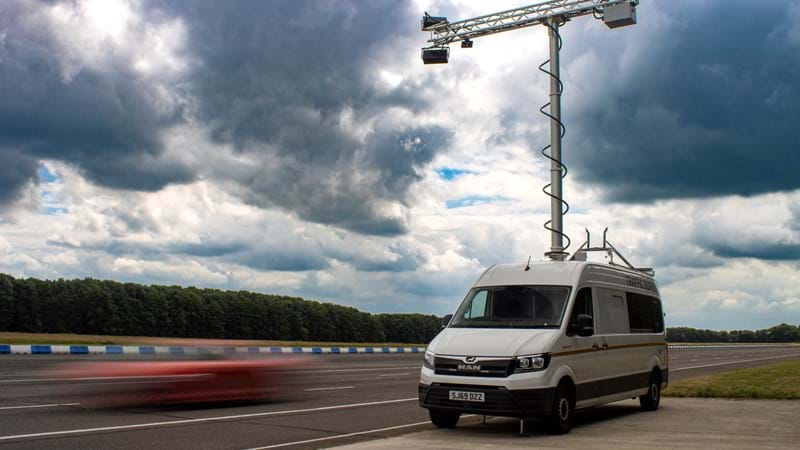Unsafe driver detected every six minutes during UK-first trial
Published
21 Oct 2022
A UK-first trial of new safety technology has recognised motorists holding mobile phones or driving without seatbelts every six minutes.

Share this article
The ‘sensor test vehicle’ has been trialled in recent weeks on England’s motorways and major A-roads as part of a research project carried out alongside Warwickshire Police.
The vehicle uses AI (artificial intelligence) detection equipment, which alongside confirmatory human analysis can help ascertain whether drivers are distracted at the wheel or they – or a passenger – are failing to wear a seatbelt.
At the time of writing, a total of 122,241 vehicles have been checked on the M40 and A46 as part of the trial, over a period of 64 hours.
This has led to 152 mobile phone detections and has identified 512 vehicle occupants without a seat belt. Of the 664 offences detected, it is estimated that 530 (79.81%) were committed by people between the ages of 30 and 49, while 627 (94.42%) of those caught out are male.
The findings come just a week after it was announced that the proportion of car occupants killed in crashes who were not wearing a seatbelt has reached the highest level on record.
Some 30% of people killed in cars on Britain’s roads last year were not wearing a seatbelt, according to data published by the Department for Transport (DfT). That is up from 23% during the previous 12 months and represents the highest annual percentage in records dating back to 2013, when the figure was just 19%.
We launched the van alongside consultants AECOM as part of a continuing campaign to promote safe driving and reduce instances of risky behaviours on England’s busiest roads.
Project EDWARD – which stands for ‘Every Day Without a Road Death’ – is a national platform for highlighting best practice in road safety, and is holding its yearly ‘Week of Action’ from 17 October.
Our Road Safety Team leader Jamie Hassall said:
“Safety remains our top priority and we want everyone to get to their destination safely. Sadly, the results of this trial have shown that some drivers do not feel the need to wear a seatbelt or become distracted by their phones.
“Using any phone while driving is dangerous - driving is a highly complex task requiring a person’s full attention, as any error can be catastrophic. Drivers who talk on phones, both hands-free and hand-held, are four times more likely to be in a crash resulting in injuries.
“We want to see if we can change driver behaviour and therefore improve road safety for everyone. Our advice is clear; buckle up and give the road your full attention.”
Dr Jamie Uff, Technical Director - Strategic Consultancy, Transportation at AECOM, is the lead research professional on the trial and has been managing the deployment of the sensor test vehicle. He said:
“The data drawn from this trial has really indicated how vital it is that we have new technologies capable of detecting driving offences. The pioneering artificial intelligence is being utilised alongside confirmatory human assessment to make sure that the process is as efficient and accurate as possible.
“The data, which is being analysed solely in the UK, is allowing us to gain a huge amount of vital insight into driving habits. The trial is allowing us to differentiate between actual behaviour and reported/expected behaviour – meaning different conclusions or clarifications can be drawn.”
“It’s important to remember that every single incident of dangerous driving could potentially cause death or serious injury, and that is ultimately what we’re trying to prevent with this trial.”
Over 216 Notices of Intended Prosecution (NIPs) have been issued by Warwickshire Police as a result of these findings.
The trial of the vehicle is taking in place in Warwickshire throughout October. Following the end of this trial, National Highways and AECOM will analyse results fully before a decision will be taken on the vehicle’s possible future deployment on the strategic road network.
